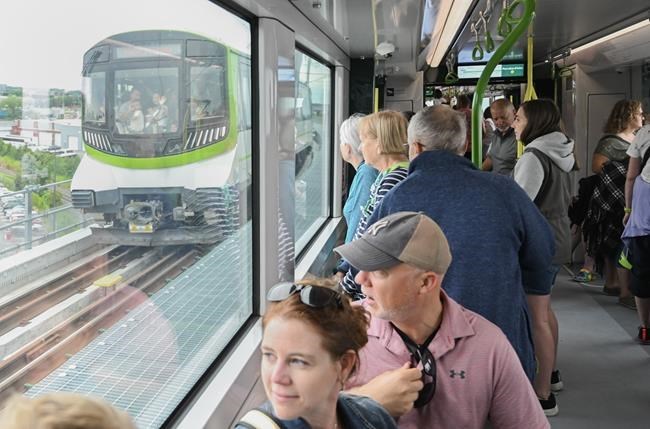MONTREAL — Lineups wound through Montreal's central transit station on Saturday as tens of thousands of people waited to board the metro area's new light-rail train system, with many showing up just to marvel at the new service even if they don't expect to take it often.
The first section of the driverless, electric train system known as the Réseau express métropolitain, or REM, is free to ride this weekend ahead of its official launch on Monday.
More than 60,000 people took advantage of the offer on Saturday, the network reported on social media. It said it stopped accepting new passengers just before 1 p.m. to ensure those who had already embarked would be able to return to their points of departure.
Five stations are now open on the REM segment connecting downtown Montreal with the suburb of Brossard, Que. to the southeast across the Saint Lawrence River.
It's the first part of what will eventually become a 26-station network spanning 67 kilometres, representing Montreal's biggest transit expansion since the construction of the metro in the 1960s.
The opening of the REM was a particularly monumental occasion for Jean-Pierre Nadeau, who said he remembers taking part in the inauguration of the metro system in 1967 when he was 15 years old.
"It's wonderful," he said of the REM as he waited with family for a train at central station. Nadeau, a retiree, said he doesn't plan to use the light-rail system frequently but still looks forward to its completion.
"That's what it takes to relieve highway congestion," he said.
Officials have said the REM trip between Montreal and Brossard takes 18 minutes, which they estimate is 20 to 30 minutes faster than driving the route during rush hour.
Two other branches of the light-rail network serving Montreal's western and northern suburbs aren't expected to open until the end of 2024, while a link to the city's airport won't be ready until 2027.
Renato Rocha, who lives in Brossard and came to try the REM ahead of his once-a-week trek to downtown Montreal for work, said he's already excited about the arrival of a new transit offering.
"It looks like a good option from now on," he said, adding he's eager for the rest of the REM network to launch. "There's still a lot to do. In a few years it will be exceptional."
Riders like Marie-Thérèse Pham, who liveds in Montreal and plans to use the REM for weekend cycling excursions, expressed excitement about new, car-free access to recreational opportunities.
Aleksey Zaitsev, who was at central station Saturday with his children, said he's thrilled to have a station near his home on Nun's Island, a part of Montreal that previously lacked a rail link to the rest of the city.
"It’s very exciting for our kids to head into town for events,” he said. “Our kids grew up on the island ... so it's a great, welcome change."
Still other REM passengers said they came simply to admire the automated, driverless trains and the views they offer from their elevated tracks.
"The feeling is a bit strange," said Maxime Bouchard-Lévesque of the experience of passing above car traffic. "I guess we'll get used to it."
“We’ve never actually been to Brossard," said Laurel Ovenden, a Montreal resident, who along with Alex Busby came to try out the REM with friends and family.
But Hélène Bounoua, a retiree who lives in the town of Greenfield Park, Que. near Brossard, said she worries commuters will be put off by the need to transfer between buses, the REM and Montreal metro to access most of the city.
Matthew Adler is also reserving judgement on the REM's efficacy.
“We’ll see how it alleviates any congestion on the bridges," he said. “It certainly has the potential. We’ll find out in the next five to 10 years.”
This report by The Canadian Press was first published July 29, 2023.
---
This story was produced with the financial assistance of the Meta and Canadian Press News Fellowship.
Thomas MacDonald, The Canadian Press




